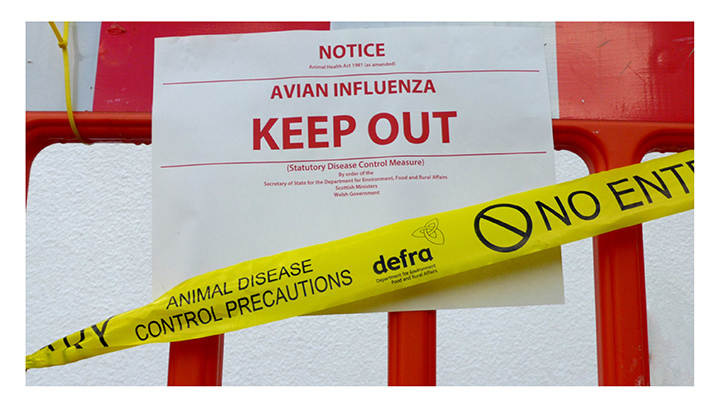Regional housing measures for poultry and captive birds are to be introduced in Norfolk, Suffolk and parts of Essex from 12 October to help stop the spread of avian influenza.
This means that all bird keepers in these hotspots must keep their birds indoors and follow strict biosecurity measures to help protect their flocks, of whatever type or size. The Chief Veterinary Officer is now encouraging all bird keepers in the affected regions to use the next few days to prepare, including taking steps to safeguard animal welfare, consult their private vet and expand housing where necessary.
The new housing measures build on the strengthened biosecurity measures that were brought in as part of the regional Avian Influenza Prevention Zone (AIPZ) last month.
In addition to this, a regional AIPZ remains in place across Devon, Cornwall and parts of Somerset, where keepers must follow biosecurity measures.
The UK has faced its largest ever outbreak of bird flu with over 170 cases confirmed across the country since late October 2021.
The regional housing measures and AIPZs will remain in place until further notice, and will be kept under regular review as part of the government’s work to monitor and manage the risks of avian influenza.
This does not apply to the rest of England, but all bird keepers should still follow enhanced measures at all times to prevent the risk of future outbreaks. However, additional restrictions also apply to in disease control zones in force surrounding infected premises.
The wild bird risk across Great Britain is maintained at medium and the risk to poultry with stringent biosecurity is maintained at low. However, the risk to poultry with poor biosecurity has been increased to medium, in light of the increased number of infected premises observed during September and the distance of some of these, as well as wild bird cases, from the coast. All bird keepers should follow enhanced measures at all times to prevent the risk of future outbreaks.
Dr Christine Middlemiss, the UK’s Chief Veterinary Officer, said: “We are seeing a growing number of bird flu cases on commercial farms and in backyard birds across the country driven by high levels of disease within wild birds. Unfortunately, we expect the number of cases to continue to rise over the coming months as migratory birds return to the UK, bringing with them further risk of disease that can spread into our kept flocks.
“We’re taking action already by implementing regional Avian Influenza Prevention Zones and housing measures in the worst-affected areas, but it is important that all bird keepers – wherever they are in the country – ensure that cleanliness and hygiene are at the forefront of their minds to keep their flocks safe and limit the impact of the outbreak.”


